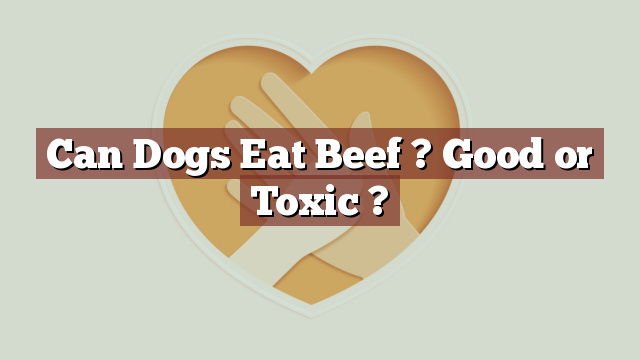Can Dogs Eat Beef? Good or Toxic?
Knowing what foods are safe for our pets is essential for their overall health and well-being. While dogs are primarily carnivores, it’s crucial to understand the potential risks and benefits of feeding them certain types of meat, such as beef. In this article, we will delve into the nutritional value of beef for dogs, its safety, potential risks and benefits, and precautions to take if your dog consumes beef.
Nutritional Value of Beef for Dogs: A Detailed Analysis
Beef is a protein-packed meat that contains various essential nutrients beneficial for dogs. It is an excellent source of high-quality protein, which plays a vital role in muscle development and repair. Additionally, beef is rich in vitamins and minerals, including B vitamins (such as B12), zinc, iron, and selenium. These nutrients are essential for maintaining a healthy immune system, promoting proper growth and development, and supporting various bodily functions.
Can Dogs Eat Beef? Is It Safe or Toxic for Them?
Dogs can indeed eat beef and include it as part of their diet. However, it is crucial to ensure that the beef is properly cooked and prepared. Raw or undercooked beef can pose health risks to dogs, as it may contain harmful bacteria like Salmonella or E. coli, which can lead to digestive issues and other serious health problems. Therefore, it is always recommended to cook beef thoroughly before feeding it to your canine companion.
It’s important to note that some dogs may have specific dietary restrictions or food allergies that make beef unsuitable for them. If your dog has any underlying health conditions or known allergies, it is best to consult with your veterinarian before introducing beef into their diet.
Potential Risks and Benefits of Feeding Beef to Dogs
Feeding beef to dogs in moderation can have several potential benefits. As mentioned earlier, beef is an excellent source of protein, which is essential for muscle maintenance and growth. It also provides dogs with essential amino acids that cannot be produced by their bodies. Moreover, the vitamins and minerals found in beef can support various bodily functions and contribute to overall health.
However, there are also potential risks associated with feeding beef to dogs. Some dogs may have difficulty digesting beef, leading to digestive issues such as diarrhea or upset stomach. Additionally, certain cuts of beef, especially those high in fat, can contribute to obesity or pancreatitis in dogs. It is crucial to feed beef in moderation and choose lean cuts to minimize these risks.
What to Do If Your Dog Eats Beef: Precautions and Measures
If your dog consumes beef, it is important to take certain precautions and measures. If the beef was cooked and prepared properly, there is usually no cause for concern. However, if your dog exhibits any unusual symptoms such as vomiting, diarrhea, or lethargy, it is advisable to consult with your veterinarian.
If you suspect that your dog has consumed raw or undercooked beef, it is essential to monitor their health closely for any signs of foodborne illness. Contact your veterinarian immediately if you notice any symptoms or if you have concerns about your dog’s well-being.
Conclusion: Moderation and Quality Control Are Key for Feeding Beef to Dogs
In conclusion, dogs can safely eat beef when it is properly cooked and prepared. Beef provides essential nutrients and can be a valuable addition to a balanced canine diet. However, moderation is key, and it is important to choose lean cuts of beef to minimize the potential risks associated with high-fat content. If you have any concerns or questions about feeding beef to your dog, it is always best to consult with your veterinarian, who can provide tailored advice based on your dog’s specific needs. By practicing moderation and ensuring quality control, you can safely incorporate beef into your dog’s diet and contribute to their overall health and happiness.
Thank you for investing your time in exploring [page_title] on Can-Eat.org. Our goal is to provide readers like you with thorough and reliable information about various dietary topics. Each article, including [page_title], stems from diligent research and a passion for understanding the nuances of our food choices. We believe that knowledge is a vital step towards making informed and healthy decisions. However, while "[page_title]" sheds light on its specific topic, it's crucial to remember that everyone's body reacts differently to foods and dietary changes. What might be beneficial for one person could have different effects on another. Before you consider integrating suggestions or insights from "[page_title]" into your diet, it's always wise to consult with a nutritionist or healthcare professional. Their specialized knowledge ensures that you're making choices best suited to your individual health needs. As you navigate [page_title], be mindful of potential allergies, intolerances, or unique dietary requirements you may have. No singular article can capture the vast diversity of human health, and individualized guidance is invaluable. The content provided in [page_title] serves as a general guide. It is not, by any means, a substitute for personalized medical or nutritional advice. Your health should always be the top priority, and professional guidance is the best path forward. In your journey towards a balanced and nutritious lifestyle, we hope that [page_title] serves as a helpful stepping stone. Remember, informed decisions lead to healthier outcomes. Thank you for trusting Can-Eat.org. Continue exploring, learning, and prioritizing your health. Cheers to a well-informed and healthier future!

